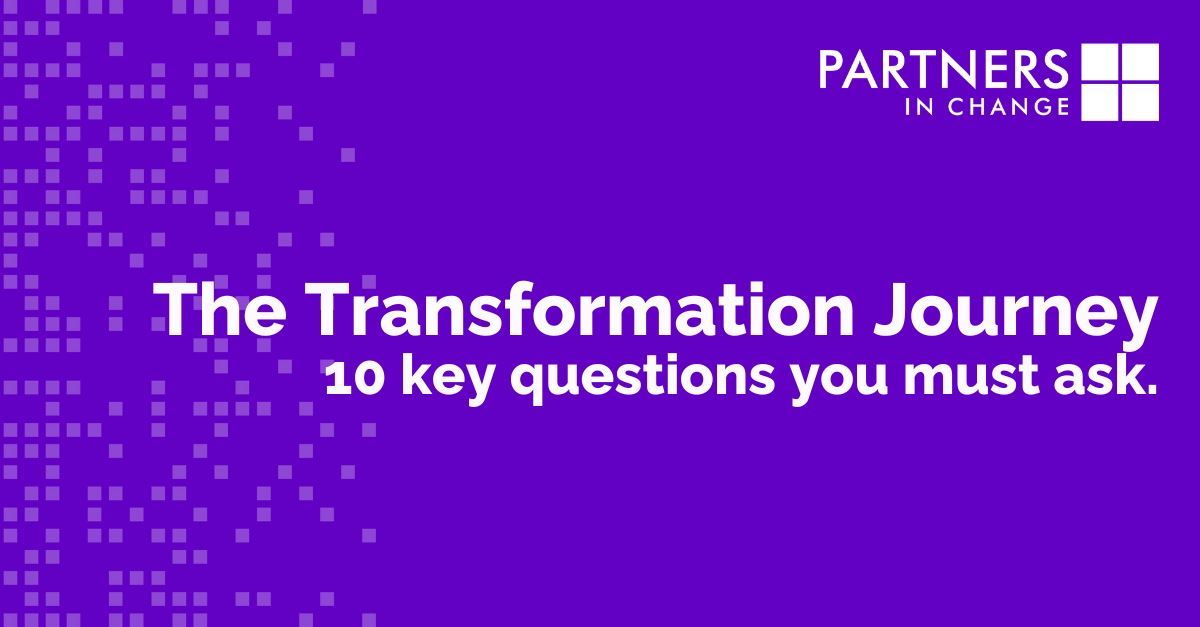
The pace, potential benefits and disruptive nature of technological change means that organisations must always be open to transformation if they are to compete with challengers and the rapidly changing expectations of their customers. But every transformation eats time, human resources and money and not every transformation succeeds.
So what steps can you take ahead of your change and transformation journey to improve your chances of success?
Answer this set of ten questions and you will avoid the most common change and transformation points of failure.
1. Is there a solid commitment from the CEO?
Visible and heartfelt CEO commitment to a programme of change is vital if successful and sustainable change is to be delivered. Regular reinforcement of their personal and unwavering commitment helps win hearts and minds, removing the blockers, negativity and cynicism that accompanies large scale change in many businesses.
2. Are the executive ready to support?
Every programme needs a range of support. Other programmes, business units, central functions and third-party partners are all vital pillars if true transformation is to be achieved. To secure the necessary resource and commitment, each functional group must be fully on-board, directed and motivated to help.
3. Is the target end-state fully understood?
Clarity keeps everyone focused on a shared vision and helps ensure the right decisions are made at the right points throughout the journey. Crucially, the vision must be built with every stakeholder in mind and include the ‘what’, the ‘why’, the ‘how’ and the ‘when’.
4. Do we truly understand the risks we face?
The more complete the understanding, the less the likelihood of unpleasant surprises during the programme life potentially derailing it and undermining confidence across the organisation. Spending time identifying, defining and planning risk mitigation is always time well spent.
5. Can we deliver in ‘chunks’?
A ‘big-bang’ approach to transformation or complex change is seldom the right choice simply because it requires a rigour (and imposes risks) that most organisations do not possess. Broken down, the task becomes easier to digest, to plan for and to communicate.
6. Can we demonstrate early success?
This is vital if the programme is to win hearts and minds across the business. Meaningful and reportable positive results, celebrated as the first step in a long journey, gives everyone confidence and belief. Equally important, those doubters and those that are perhaps working against the change can see that the transformation train has left the station and they had better get on board!
7. Can we communicate progress to our stakeholders?
The bigger the programme, the better the communication needs to be in order to achieve alignment and positivity. For many organisations, this requires a step change in style, frequency and strategy. For example, whenever leaders address their teams, putting the transformation first on the agenda, in language appropriate to the audience on the day, helps build a consistent understanding of the importance of the programme.
8. Do we have the necessary processes and tools?
Processes and tools are important components in guiding complex change and transformation. Crucially, they should never lead the programme; nor should they act as a straitjacket. Instead, they should be flexible, acknowledging and accommodating the myriad variables that make every programme different.
9. Have we the capacity?
Have the people in your organisation got the time to get involved in the planning, shaping and delivery of the transformation? Is their capacity available at sufficient levels to match the dynamic needs of the programme over time? Has BAU been stress-tested against a partial loss of resource?
10. Have we the capability?
Often confused with capacity, capability refers to the specialist skills and experience required to deliver successful and sustainable change. Seconding your brightest and best into supporting transformation is always helpful for both the programme and their development but major change programmes usually require different skills at different times and it is likely you’ll need to find these beyond your current team.



Recent Posts